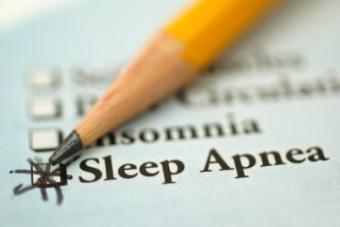
Sometimes a person stops breathing for short periods during the night. This condition is called sleep apnea, and it causes poor quality sleep and is linked to other possible conditions such as weight gain. Sleep apnea is a chronic condition and is often undiagnosed.
Types of Sleep Apnea
There are two main types of sleep apnea: obstructive sleep apnea (OSA) and central sleep apnea. When a combination of these two types occurs, it is called mixed, or complex, sleep apnea.
Obstructive Sleep Apnea
Obstructive sleep apnea is the more common form of sleep apnea and has a mechanical basis. In OSA, the airway - in the nose, mouth, or throat -- collapses during sleep; it can sometimes become blocked by soft tissue as well. This blockage leads to shallower breathing or pauses in breathing.
During the night, the diaphragm and the chest muscles work harder to get the air through the narrowed passageway with a shallow breath or a pause. As the air squeezes through the small opening, you begin to snore - usually loudly. The frequent episodes make it difficult to get a good night's sleep, can reduce the flow of blood to the organs, and can affect the heart rate.
Central Sleep Apnea
In central sleep apnea, the airway is not blocked. However, there are similar pauses because the brain does not signal the muscles to breathe normally. This is linked to problems in the respiratory center in the brain. Snoring does not occur with central sleep apnea. It's important to note that central sleep apnea can happen at the same time as obstructive sleep apnea.
Causes of Sleep Apnea
Sleep apnea occurs in around 25% of men and 10% of women. It can affect people of all ages, but it's especially common in people over the age of 40 and who are overweight. Each type of sleep apnea has distinct causes.
Causes of Obstructive Sleep Apnea
One major cause of OSA is obesity. People who carry a lot of extra weight often have fat in the neck area as well, which can compress the tissues around the airways. About half of the people who have sleep apnea are overweight.
Other causes of obstructive sleep apnea are associated with mechanical physical issues. Some examples include the following:
- Bone deformities
- Enlarged tissues in the nose, mouth, or throat area
- Small jaw with an overbite
- A large neck (even in people who are thin)
Causes of Central Sleep Apnea
For central sleep apnea, the cause is usually associated with a serious illness. This is especially true if the illness affects the lower brainstem which is the part that controls breathing.
The following conditions may play a role in this type of sleep apnea:
- Brain stem damage caused by, for example, stroke, injury, or encephalitis
- Neurological diseases (e.g. Parkinson's, Alzheimer's, and Lou Gehrig's disease)
- Degeneration or damage to the cervical spine or base of the skull
- Heart disorders like atrial fibrillation or congestive heart failure
Symptoms of Sleep Apnea
The signs of obstructive sleep apnea and central sleep apnea can be the same; this can make it difficult to distinguish between the two conditions.
Common symptoms include excessive daytime sleepiness, periods of breathing pauses witnessed by someone else, abrupt awakenings, and morning headaches. Snoring is a common symptom as well but is more often a sign of OSA.
Treatment Options
There are multiple treatment options for sleep apnea. For mild cases of sleep apnea, losing weight might resolve the symptoms. If this does not work or if the condition is more serious, there are other treatments like oral appliances and continuous positive airway pressure. Surgery may be an option if the other methods are not effective. However, for people who have a structural abnormality, surgery may be a first-line option. For people with central sleep apnea, management of the underlying health conditions like heart failure or atrial fibrillation may improve the sleep apnea.
Dangers of Untreated Sleep Apnea
About 18 million people have this condition, but it can be difficult to diagnose if there is no witness to the breathing lapses or the snoring. It is important to diagnose and treat this condition because undiagnosed sleep apnea can led to significant health problems. Sleep apnea can lead to high blood pressure, a higher risk of dying from a heart attack during the middle of the night, weight gain, increased risk of diabetes, and more car accidents.
Dealing with Sleep Apnea
It is important to know the type of sleep apnea you have to figure out the possible cause. If you are overweight and have been diagnosed with OSA, then your symptoms are likely to improve if you achieve a healthier weight. Using other treatment options can help as well. Your goal is to get a good night's sleep and to avoid the harmful effects that may be associated with sleep apnea.







